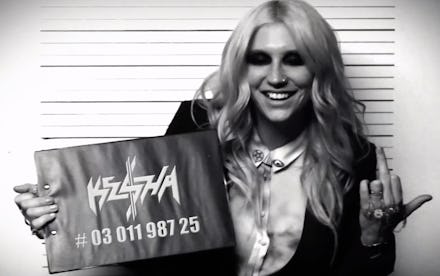This Is What the Media's Vicious Double Standard Has Done to Ke$ha

In case you haven't noticed, pop singer Ke$ha has been off the radar recently. Though she recently returned to the spotlight as a judge for Rising Star, earlier this year, she spent two months in rehab — not for substance abuse, as many speculated, but for an eating disorder. Partially wanting to set the record straight and partially to get the chance to communicate her side of the story, she recently wrote a very candid essay for Elle UK.
"I’ve always tried to be a crusader for loving yourself, but I’d been finding it harder and harder to do personally ... I felt like part of my job was to be as skinny as possible, and to make that happen, I had been abusing my body. I just wasn’t giving it the energy it needed to keep me healthy and strong."
The most important point that she wanted to get across was not that she was back in full force and will continue to brush her teeth with Jack Daniels, but instead that even the women we tout as "empowering" and "strong" in the music industry can easily succumb to the media's vicious work generating body image insecurities. Because there's a new double standard in the industry that's even more insidious than the one before it.
Image Credit: TMZ
It's been the case for awhile that, across the entertainment industry, women are subjected to more intense scrutiny for their body image than men. In fact, there are so many of these cases that many lists and databases have been compiled with the names of artists who have suffered similar conditions.
Ke$ha revealed that her negative body image originally stemmed from being a victim of bullying when she was young. According to Billboard, she tried to focus on art as a distraction, but the bullying took on another form as she started gaining media attention. She isn't the first to draw the comparison between the media and childhood bullies — Disney star Demi Lovato did the same, though it didn't stop the Disney Channel from allowing jokes about anorexia in its shows.
Ke$ha's story is common, but it's also unique because she represents a new and even more dangerous double standard that's emerging in the industry. Increasingly, the media is concerned with the strength of a woman's feminist convictions and whether she qualifies as a "strong" female role model or not. There's no less scrutiny than before, but women now are not only being evaluated on their bodies but also on their 'badass' resistance to that kind of scrutiny.
For a woman like Ke$ha, whose declarations of independence "We R Who We R" and "Warrior" made her out to be the kind of strong, fierce female that the industry demands she be, seeking help for real issues only becomes more difficult. She was the one, after all, who was celebrated for giving men a taste of their own objectification and for representing the kind of woman who didn't need to seek anyone else's approval: "I don't need you or your brand new Benz / Or your bougie friends / I don't need love looking like diamonds," she sang on a song co-written with Dr. Luke, who reportedly called her a "refrigerator" (though he denies it).
It's a harsh web of judgment that few female artists are spared. Rapper and fellow femme fatale Nicki Minaj even recently divulged at the BET Awards that she would have rather died from sickness than be photographed by TMZ looking weak and seaking help, which seemed to barely raise a red flag for many people.
But honest admissions like Ke$ha's, while upsetting, truly shed light on the unrealistic and dangerous expectations that are placed on women everywhere — not just those who are constantly in the spotlight.
The old double standard is still blatant: The Notorious BIG was an overweight man but still managed to be crowned by many as a king of rap, while female performers such as Ke$ha are constantly being judged and defined by their appearance. But the new one is even worse — we won't change the old double standard, but we'll evaluate women based on their response to it, too.
Many of these women are scared to be candid about their issues for fear of being seen as "weak" or of losing their ability to be role models for their fans. But honesty is its own power — especially when the system is this broken. Coming forward like this is only ever a good thing.